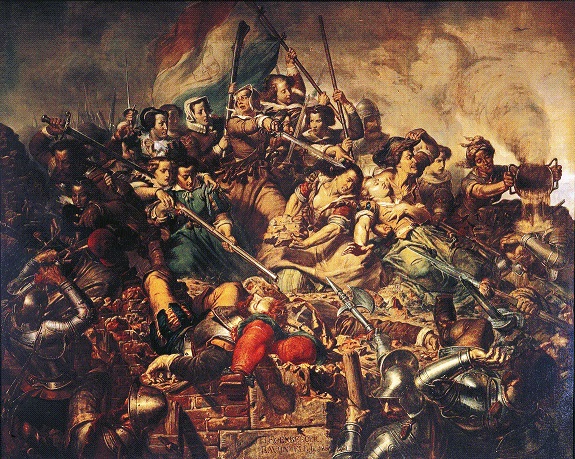Natalie Luhrs is unhappy about John Wright’s invocation of Robert Heinlein to bolster claims of witch hunts against rightwing science fiction writers:
So when someone like John C. Wright holds up Heinlein as the best SF writer ever, I have to wonder what world they’re living in. An important writer in the genre, absolutely. The best ever? Really? Way to declare the race over before everyone’s even gotten to the starting line, buddy.
Because that’s what he’s doing, right? He’s trying to draw a line around SF. In Wright’s world, there’s no room in SF for people who aren’t like him and, furthermore, no one’s work can ever come close to that of a man who died in 1988. That’s just. No. I don’t want to read that kind of SF anymore. I did my time there and it’s well past time to move on.
It all started when Wright flounced out of the SFWA claiming to have been subjected to harassment, though refusing to provide evidence of this. Wright went on to further clarify his motivation and the situation science fiction was in through a long post at the Intercollegiate Review, claiming that Robert Heinlein could not win a Hugo Award today:
At one time, science fiction was an oasis of intellectual liberty, a place where no idea was sacrosanct and no idea was unwelcome. Now speculative fiction makes speculative thinkers so unwelcome that, after a decade of support, I resigned my membership in SFWA in disgust. SFWA bears no blame for all these witch-hunts, or even most; but SFWA spreads the moral atmosphere congenial to the witch-hunters, hence not congenial to my dues money.
In his article Wright provides several examples of people supposedly chased out of sf fandom or otherwise punished for their opinions, a veritable who’s who of rightwing jackasses confusing criticism for harassment, including Vox Day, Larry Correia, Orson Scott Card and Elizabeth Moon. (The truth is of course rather different than how Wright presents it.)
In her own response to Wright’s article, Rachael Acks wonders why Wright’s so sure a modern Heinlein would’ve been held the same opinions as people like Day or Orson Scott Card in he first place:
I’m also forced to wonder at the implied assumption that, had Robert Heinlein been born in 1977 (or 1967) instead of 1907, he would be writing the exact same stuff in 2014 that he wrote in 1954 (The Star Beast) or 1964 (Farnham’s Freehold–holy shit, I hope not!). Feels kind of insulting to him that if he’d grown up in a different time he wouldn’t have maybe had some different opinions, but I guess that shouldn’t be surprising coming as it is from someone who has attitudes about gender roles that might have been more at home in the Victorian era.
In his article Wright also talked about law and custom and the differences between them, which annoyed somebody who actually makes her living as a lawyer enough to strike back with Heinlein references of her own:
As an aside? I don’t think Dr. Harshaw would agree with your superficial assessment of law versus custom. (Nor with your extensive ramblings on morals, given his comment on “Customs, morals – what’s the difference?” followed by his description of what you consider moral absolutes as “the psychotic taboos of our tribe.” In fact? You’re a textbook example of Harshaw’s definition of a prude: a person who believes “his own rules of propriety are natural laws.” Dr. Harshaw could admit that his own tastes were not the arbiters of what is correct for all people. You cannot.) Yeah, people who think like you don’t have a lock on allusions to Heinlein’s body of work, any more than you have exclusive license to make 1984 references. You will, as they say, deal.
Heinlein died in 1988 so it’s been easy for rightwingers like Wright to hijack his image and twist it into a caricature of the man, into somebody who of course would agree with them and by on their side in their culture wars. But the truth is that Heinlein was always much more complex than that, willing and able to change his views when he needed to and more likely to have laughed at Wright’s pretensions than agreed with them. He may have been rightwing, but he was never the small minded hobgoblin his “fans” want to make him into.
Heinlein after all was the man who went from “homosexuality is a disease” in Stranger in a Strange Land to having his characters not bothered about the gender of the people they slept with in Time Enough for Love and sequels. He’s the man who saw reds under the bed and argued for continued nuclear tests to keep America strong, but who also made the hero of Starship Troopers Filipino, the protagonist of Tunnel in the Sky black.
You cannot reduce Heinlein to a one dimensional “greatest science fiction writer ever”, you have to take his influence warts and all. He was wrong often, but he wasn’t wrong always and he was willing to learn when he was wrong. Science fiction is richer for his contributions, but not if we hold him up as a model to slavishly follow; he himself would be the first to know that would be pointless.
